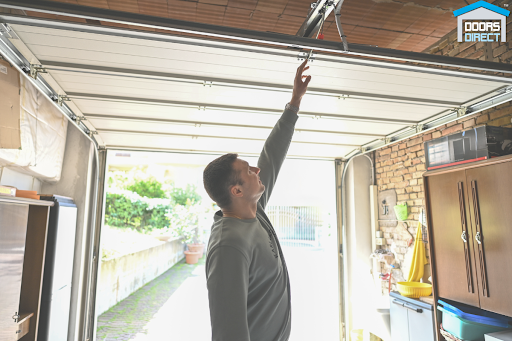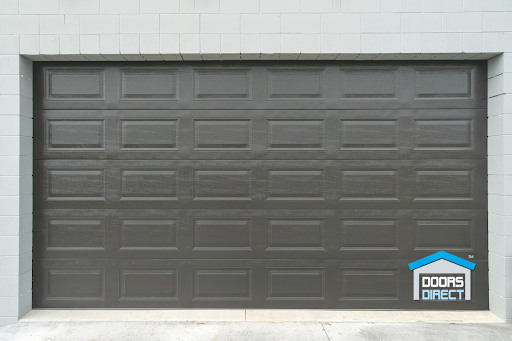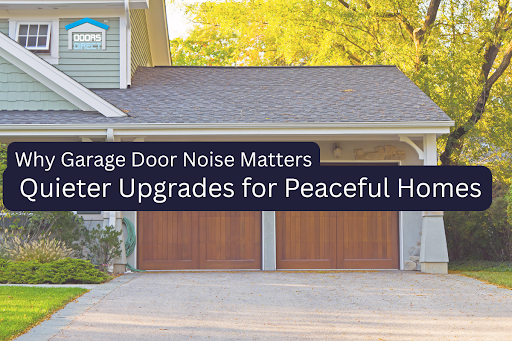Every morning, your garage door sounds like a construction site opening for business. The whole neighbourhood knows your schedule, and your family can’t sleep through the racket.
Our team at Doors Direct has seen how garage door noise affects Brisbane homes. After working with hundreds of families, we know exactly what causes these problems. More importantly, we know how to fix them.
So, here’s our insight on how to identify the noise sources, practical solutions, and upgrades that bring desired results.
Understanding Your Garage Door Noise Problem
Before you can fix the noise, you need to know what’s causing it. Different sounds point to different problems, and getting this right saves you time and money.

Here’s what those annoying sounds actually mean:
- Grinding sounds: This usually happens when your garage door’s rollers are worn out or the tracks need cleaning. That metal-on-metal contact creates an awful screech every morning.
- Squeaking noises: The main reason behind this is dry hinges begging for lubrication, especially during Brisbane’s humid months when rust accelerates.
- Rattling sounds: You’ll hear this when loose hardware vibrates against the door. A few loose bolts can make your entire garage door sound like a tin shed in a storm.
- Thumping or banging: These heavy sounds typically indicate your garage door is unbalanced or the springs need adjustment. When springs wear out, your door works twice as hard to open.
- Scraping sounds: When your door rubs against the tracks or frame, this sound originates. Such a sound indicates that something’s shifted out of alignment.
According to a recent study on garage door maintenance, nearly 82% of homeowners aren’t caring for their garage doors properly, which directly contributes to noise problems. Fortunately, most of these issues have simple solutions that don’t require professional help.
Once you know what’s making the racket, it’s time to learn why some doors whisper while others wake the dead.
The Science Behind Quiet Garage Doors
Ever wondered why some garage doors glide silently while others sound like they’re demolishing your house? The answer lies in understanding how sound behaves and what materials can prevent it.

How Sound Travels Through Your Home
Sound waves don’t stay contained in your garage. They travel through walls, floors, and ceilings, amplifying as they bounce around your home. When your garage door creates vibrations, these sound waves follow the path of least resistance. This explains why you hear every creak upstairs even when the garage is on the ground level.
Materials That Reduce Noise
Steel doors naturally create more noise than their insulated counterparts. The solution lies in adding polyurethane foam insulation, which keeps your garage warmer while absorbing sound waves before they can escape. Rubber seals around the door edges work similarly by creating barriers that trap sound inside the garage space.
Design Features for Noise Reduction
Modern garage doors use nylon rollers instead of metal ones, which entirely eliminates that grinding sound. Belt-driven openers run significantly quieter than chain-driven models because they avoid metal links clanking together. Balanced springs also reduce the workload on your motor, resulting in less mechanical noise overall.
After putting these principles to the test, we’ve found that combining the right materials with proper design creates doors that operate almost silently. Now let’s look at specific methods you can use to tackle your noise problem.
Proven Methods to Remove Background Noise
Most garage door noise problems have easy solutions that you can tackle with basic tools and a weekend afternoon. Let’s get that racket under control so you can finally have peaceful mornings again.
Here are the methods that deliver fruitful results:
- Lubricate all moving parts: White lithium grease works best on hinges, rollers, and tracks. We recommend applying it every six months because this prevents metal-on-metal contact that creates those grinding sounds. Skip the WD-40 since it attracts dirt and makes problems worse.
- Tighten loose hardware everywhere: Start with the hinges and work your way around the entire door system. Vibration loosens bolts over time, and even slightly loose hardware creates rattling that echoes throughout your home.
- Replace those old metal rollers: Nylon rollers cost about $15 each, but they’re worth every penny. They eliminate grinding sounds completely while lasting twice as long as metal ones.
- Adjust your opener’s force settings: Most garage door openers have adjustment screws that control how hard the motor works. When you reduce the force setting, your motor doesn’t have to strain as much, which means significantly less operational noise.
- Install rubber isolation pads under your motor: These simple pads prevent vibrations from traveling through your ceiling into living spaces above. They cost under $20 and deliver noticeable noise reduction.
- Test and fix door balance issues: An unbalanced door forces your motor to work overtime, creating unnecessary noise. To check this, disconnect the opener and lift your door manually. If it doesn’t stay put when released halfway up, your springs need adjustment.
Our team discovered through using these methods that most homeowners see immediate improvements. Now let’s explore some modern upgrades that can make your door even quieter.
Modern Garage Door Upgrades That Reduce Noise
When simple fixes don’t work, it’s time to consider upgrades that can make your garage door operate quietly.
Here are the most effective upgrade options:
- Insulated garage doors: Polyurethane foam filling absorbs sound waves while keeping your garage warmer. Most homeowners see significant noise reduction with just one upgrade.
- Belt-driven openers: Reinforced rubber belts work wonders for homeowners tired of clanking chains. You’ll pay about $200 more than chain models, but eliminate that characteristic rattling completely.
- Nylon roller systems: Metal-on-metal grinding becomes a thing of the past once you switch to nylon rollers. Beyond quieter operation, they’re self-lubricating and last twice as long as steel versions.
- Modern torsion springs: Weight distribution improves dramatically compared to old extension springs. Better balance means less strain on your motor and quieter operation overall.
After extensive trials with these upgrades, we’ve found that combining insulation, belt drives, and nylon rollers can reduce garage door noise by up to 85%. Pretty impressive for a weekend project, wouldn’t you say?
Your Next Steps to Clean Audio in Your Home
Now you’ve got the knowledge to tackle your noisy garage door problem. The question is where to start and what makes the most sense for your situation.
Your best bet is to start with the basics we covered earlier. Lubricate all moving parts, tighten loose hardware, and check your door balance. These simple steps cost under $50 and often solve 70% of noise issues immediately.
When basic maintenance doesn’t deliver the results you want, that’s when you should consider the upgrades we discussed. Insulated doors, belt-driven openers, and nylon rollers represent smart investments that improve your home’s comfort and value.
Don’t let another morning start with that awful grinding sound. Contact us today to discuss how we can bring peace back to your home.

